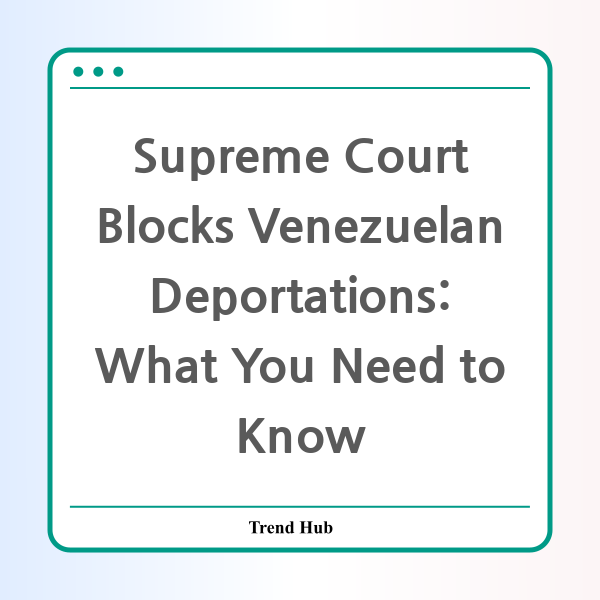* This website participates in the Amazon Affiliate Program and earns from qualifying purchases.

In a significant legal development, the U.S. Supreme Court has temporarily halted the deportation of Venezuelan detainees held in Texas. This ruling, which comes amid rising tensions surrounding immigration laws, raises numerous questions about the treatment of migrants under U.S. law.
The Supreme Court's decision was prompted by an emergency appeal from the American Civil Liberties Union (ACLU). The organization argued that U.S. immigration authorities had been improperly designating Venezuelans as gang members, thus bypassing due process. The court has decided to block any deportations from the Bluebonnet Detention Center until further notice.
Justices Clarence Thomas and Samuel Alito dissented from the majority opinion, emphasizing the contentious nature of this decision. The Alien Enemies Act of 1798, under which these detentions and deportations were planned, has a storied and controversial history in the U.S., having only been invoked during critical moments of wartime, such as World War II.
The Trump administration had cited the Alien Enemies Act as a legal basis for swiftly deporting immigrants it accused of gang affiliation, specifically members of the Tren de Aragua gang. However, the ACLU's appeal highlighted serious concerns about the potential for abuse in labeling individuals without adequate legal protections.
In the wake of the Supreme Court's ruling, the situation surrounding Venezuelan detainees has become even more pressing. Many individuals at the Bluebonnet facility were at risk of being sent back to Venezuela without a fair chance to contest their deportation. Reports have shown that some detainees were coerced into signing documents they did not fully understand, further compounding the ethical implications of their treatment.
Legal representatives have flagged numerous instances of misinformation and mistreatment at the facility, indicating a broader issue within the immigration system. There are fears that these deportations could lead to severe human rights violations, with many detainees potentially facing persecution if returned to Venezuela.
While the Supreme Court’s decision is a temporary measure, it underscores the need for more stringent safeguards when it comes to the rights of migrants. The ACLU, in a statement following the ruling, expressed relief but also emphasized the ongoing threat to these individuals' safety and legal rights.
The case has also prompted discussions about the future of U.S. immigration policy as advocates push for reforms that ensure due process for all individuals. Immigration laws, especially those as antiquated as the Alien Enemies Act, require careful scrutiny to ensure that they are not misused in contemporary contexts.
This situation highlights an important crossroad for America: balancing national security with the humane treatment of individuals seeking refuge. As these legal battles unfold, it is critical for both the public and policymakers to remain informed and engaged on issues related to immigration and human rights.
In conclusion, the Supreme Court’s decision to block deportations of Venezuelan migrants in Texas raises vital questions about legal protections for immigrants in the U.S. It serves as a reminder of the ongoing challenges faced by vulnerable populations and the crucial importance of maintaining a fair and just immigration system.
* This website participates in the Amazon Affiliate Program and earns from qualifying purchases.